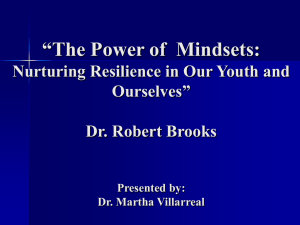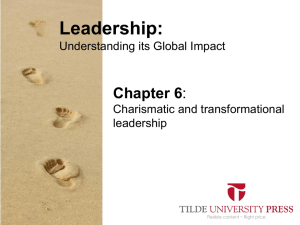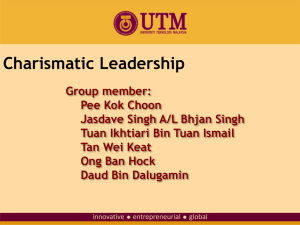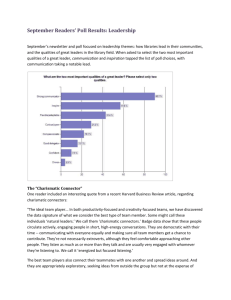Lord Coe and the Importance of Charismatic Leadership
advertisement
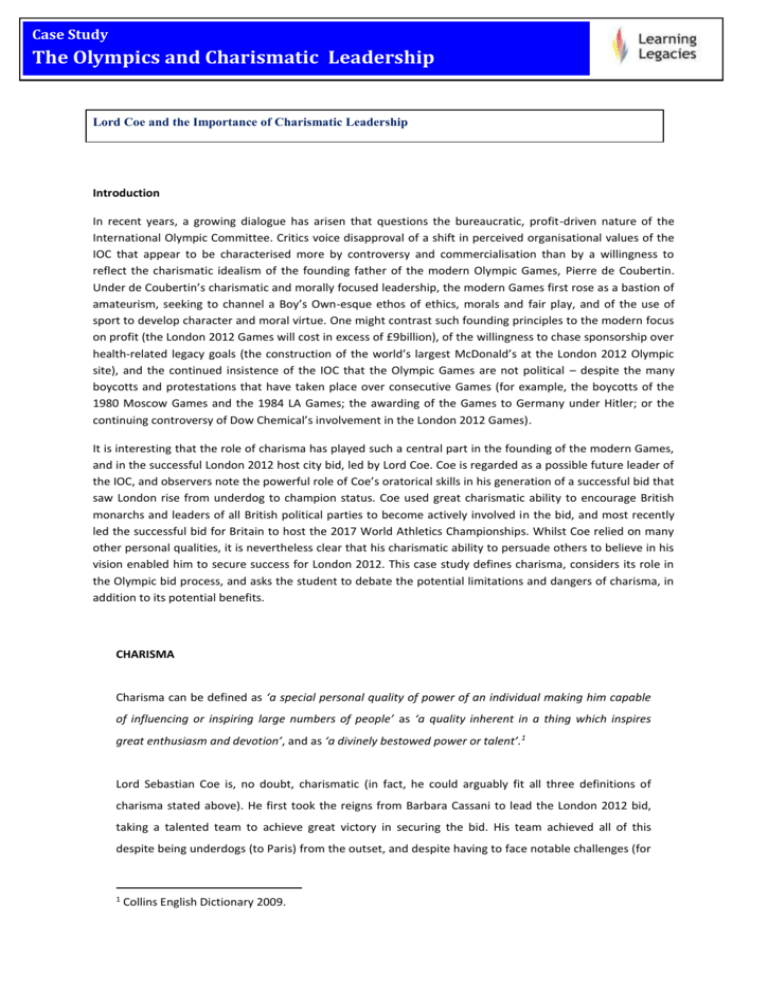
Case Study The Olympics and Charismatic Leadership Lord Coe and the Importance of Charismatic Leadership Introduction In recent years, a growing dialogue has arisen that questions the bureaucratic, profit-driven nature of the International Olympic Committee. Critics voice disapproval of a shift in perceived organisational values of the IOC that appear to be characterised more by controversy and commercialisation than by a willingness to reflect the charismatic idealism of the founding father of the modern Olympic Games, Pierre de Coubertin. Under de Coubertin’s charismatic and morally focused leadership, the modern Games first rose as a bastion of amateurism, seeking to channel a Boy’s Own-esque ethos of ethics, morals and fair play, and of the use of sport to develop character and moral virtue. One might contrast such founding principles to the modern focus on profit (the London 2012 Games will cost in excess of £9billion), of the willingness to chase sponsorship over health-related legacy goals (the construction of the world’s largest McDonald’s at the London 2012 Olympic site), and the continued insistence of the IOC that the Olympic Games are not political – despite the many boycotts and protestations that have taken place over consecutive Games (for example, the boycotts of the 1980 Moscow Games and the 1984 LA Games; the awarding of the Games to Germany under Hitler; or the continuing controversy of Dow Chemical’s involvement in the London 2012 Games). It is interesting that the role of charisma has played such a central part in the founding of the modern Games, and in the successful London 2012 host city bid, led by Lord Coe. Coe is regarded as a possible future leader of the IOC, and observers note the powerful role of Coe’s oratorical skills in his generation of a successful bid that saw London rise from underdog to champion status. Coe used great charismatic ability to encourage British monarchs and leaders of all British political parties to become actively involved in the bid, and most recently led the successful bid for Britain to host the 2017 World Athletics Championships. Whilst Coe relied on many other personal qualities, it is nevertheless clear that his charismatic ability to persuade others to believe in his vision enabled him to secure success for London 2012. This case study defines charisma, considers its role in the Olympic bid process, and asks the student to debate the potential limitations and dangers of charisma, in addition to its potential benefits. CHARISMA Charisma can be defined as ‘a special personal quality of power of an individual making him capable of influencing or inspiring large numbers of people’ as ‘a quality inherent in a thing which inspires great enthusiasm and devotion’, and as ‘a divinely bestowed power or talent’.1 Lord Sebastian Coe is, no doubt, charismatic (in fact, he could arguably fit all three definitions of charisma stated above). He first took the reigns from Barbara Cassani to lead the London 2012 bid, taking a talented team to achieve great victory in securing the bid. His team achieved all of this despite being underdogs (to Paris) from the outset, and despite having to face notable challenges (for 1 Collins English Dictionary 2009. Case Study The Olympics and Charismatic Leadership The Olympics and the Importance of Charismatic example, a Panorama special focusing on Olympic corruption; a perceived lack of support by the British media; and a transport infrastructure questioned by the IOC). Following the successful 2012 bid, Lord Coe continued to lead the development of the Games. Furthermore, many have voiced their interest in Lord Coe one day standing for leadership of the IOC (International Olympic Committee), such is his standing as a Games bid leader and former Olympic champion. Recently, Denise Lewis commented that Lord Coe’s speech, delivered as a pivotal part of London’s 2017 World Athletics Championships bid, ‘made the hairs on my neck stand up’. The importance of strong speeches was underlined at both the final decision made by the IOC in Singapore that awarded London the 2012 Olympic and Paralympic Games, and in the recent final statements made with relation to London’s successful 2012 World Athletics Championships bid. Coe’s speech carried all of the hallmarks of the charismatic orator- emotional and pragmaticunderpinned by detailed knowledge of his subject. In terms of leadership theory, there is evidence that a number of physical traits can lead followers more readily to accept an individual as a preferred leader if they are masculine, tall, with a deep voice that demonstrates maturity, and in the degree to which the facial features of the individual are symmetrical. One might argue that Lord Coe possesses at least some of these physical valuable attributes alongside his oratory ability and charismatic nature. No doubt Lord Coe has also identified the need to develop a strong and efficacious bid team, and his ability to choose individuals that share his background, motivation and enthusiasm is evident (for example, the choice of former athlete Denise Lewis). All speakers sung from a similar hymn sheet; a pronounced passion for sport and the involvement and support of world champions. Such passion and commitment were key weapons in GB’s arsenal, particularly given the fact that their financial commitment was notably less than that proposed by rival bidders Doha. Doubtless the bid team’s success in attracting and organising the 2012 Games also greatly acted in their favour. Lewis made another interesting comment regarding the 2017 bid team speeches; ‘Everyone’s performance in the presentation was key. One word, one sentence or phrase of reassurance could sway someone who was a maybe to a yes vote for us. It was an incredible experience.’ This tells us a great deal about Lewis’s belief in the charismatic power of communication – and, if her observations are correct – the IAAF’s great endorsement of the power of a charismatic presentation to sway a vote (as opposed to, say, making the decision based on the financial, organisational and logistical plans set out in rival host cities bid documents). Case Study The Olympics and Charismatic Leadership The Olympics and the Importance of Charismatic It is possible that sport is one arena where passionate, emotional messages are found and accepted more readily than in other similar environments (such as private sector companies and local councils). The competitive side of Lewis is clear in her summation of the bid experience: ‘There was lots of bubbly on Friday night, and we drank a toast to a very successful bid. I’ve been very proud to have been part of the Olympic campaign for 2012 and, as chairman of the Athlete Commission, this successful bid for 2017. It makes you feel good.’ It is interesting that context can also provide charisma to a bid, a speech, or to the value of belonging to a particular project or event. The high profile of the event, the mention of champagne and personal accomplishments in Lewis’s statement are evident, and all speak of a collective ‘charisma’ and image that doubtless attract many to the bid process, the event and the acquisition of leadership positions within it. Charismatic Leadership Theory Charismatic leadership theory identifies both the positive and negative implications of charismatic leadership. A charismatic leadership model does not assume the associated presence of morality. Whilst Lord Coe might carry positive intentions and ostensibly use his charisma to achieve positive outcomes (for example, a financial and economic legacy for London following the 2012 Games, in addition to an enhanced collective sense of national pride), other charismatic leaders might use their charismatic abilities for self-serving, ego-aggrandising, evil motives. The most commonly cited example of the ‘dark’ side of charisma is Adolf Hitler, who leveraged a national sense of desperation and fear (caused in large part by the economic sanctions imposed after WWI) to trade off of the insecurities of a nation, and to use the blaming of ethnic minorities, lack of moral conscience and considerable oratory abilities to rise to power. As charismatic leaders are able to engender a great emotional connection with, and response from, followers, they are effectively more able to sweep followers up in their message, and to inspire loyalty. It is therefore extremely important that a charismatic message is not the only criteria upon which we judge the efficacy of or preference for a particular leader. We must spend considerable time analysing the basis upon which the leader has built their message. Do they show a fundamental moral and ethical commitment to their goals and motives? Is there a level of altruism or simply a personal interest being satiated by their plans? Do they seem to have the welfare of others in mind as well as their own? And is their business or political plan watertight, or is their presentation of the facts more style than substance? One might refer to the US Republican party leadership nominations for a lesson in the use of charisma as something that appears to be relied upon – in many cases – over the ability to demonstrate a high Case Study The Olympics and Charismatic Leadership The Olympics and the Importance of Charismatic moral commitment to all minorities, or a commitment to learning the complexities of foreign policy or even gaining enough of a foothold in ones knowledge of one’s own political strategy in order to present it in national debates. A further political example of potential interest might be the formation of the new Italian cabinet, consisting for the first time ever of non-politicians, all specialists in their respective fields. Might the cabinet be less charismatic? Certainly their predecessor Berlusconi was known for his style. If they are less charismatic, however, will they still lead us more effectively out of the financial crisis than Berlusconi could? And if yes, what does this tell us about the role of charisma over expertise in a crisis situation? Charismatic leadership theory often points to the situational needs of the charismatic leader; that they require a certain mix of economic, social or other factors to create a situation where followers would be most likely to respond to emotional missives. This can explain why a truly transformational leader can ‘transform’ a nation for the better in difficult – or positive – times, whereas an immoral charismatic leader (for example, Adolf Hitler) needs to trade off the insecurities of followers in difficult times. Indeed, one might observe the fact that a number of despotic leaders have risen to power following a power vacuum created by a deposed government. Such a vacuum creates insecurity, economic and financial security. It increases a human need for a leader who can inspire hope, and who make great promises (however unsubstantiated those promises might be). It is at such times that nations can be most vulnerable. It can also, in the case of movements such as the Black Consciousness Movement and the Arab Spring uprisings , engender a sense of collective passion and emotion that leads to the ‘ordinary’ man taking great steps to engender great and meaningful changes for themselves, their communities and their nations. Further Information Yammarino, F., Avolio, B. A. (2002) Transformational and Charismatic Leadership: The Road Ahead (Monographs in Leadership and Management). JAI Press. Stutje, J. W. (2012) Charismatic Leadership and Social Movements: The Revolutionary Power of Ordinary Men and Women (International Studies in Social History). Berghahn Books. Case Study The Olympics and Charismatic Leadership Discussion What balance do you think Lord Coe and the bid team struck between the functional strength of the bid and their use of a charismatic message? Olympic athletes such as Amir Khan, Michael Phelps and Steve Redgrave have earned a great deal of money via lucrative sponsorship deals. Whilst their talent is clearly a primary reason for securing sponsorship, their charisma also makes them stand out greatly against their peers as endorsement prospects. Discuss the factors that make these athletes ‘charismatic’ and consider why charisma is viewed so positively in place of other qualities (such as a good education, or being a good parent). Identify a leader that you admire. Does charisma play a role in your admiration, or is your preference for this leader based on their specialist skills or moral & ethical commitment to a particular issue? Transformational leadership theory tells us that statistically, leaders who have a strong moral dimension and who engender trust in followers are more likely to produce successful outcomes for their followers and organisation. Why do you think ethics/morality plays a key role in organisational effectiveness? Case Study The Olympics and Charismatic Leadership WOMENS PARTICIPATION IN THE OLYMPIC GAMES This resource was produced as part of the 2012 Learning Legacies Project managed by the HEA Hospitality, Leisure, Sport and Tourism Subject Centre at Oxford Brookes University and was released as an Open Educational Resource. The project was funded by HEFCE and part of the JISC/HE Academy UKOER programme. Except where otherwise noted above and below, this work is released under a Creative Commons Attribution only licence. Exceptions to the Licence The name of Oxford Brookes University and the Oxford Brookes University logo are the name and registered marks of Oxford Brookes University. To the fullest extent permitted by law Oxford Brookes University reserves all its rights in its name and marks, which may not be used except with its written permission. The JISC logo is licensed under the terms of the Creative Commons Attribution-NonCommercial-No Derivative Works 2.0 UK: England & Wales Licence. All reproductions must comply with the terms of that licence. The Higher Education Academy logo is owned by the Higher Education Academy Limited and may be freely distributed and copied for educational purposes only, provided that appropriate acknowledgement is given to the Higher Education Academy as the copyright holder and original publisher. Reusing this work To refer to or reuse parts of this work please include the copyright notice above including the serial number. The only exception is if you intend to only reuse a part of the work with its own specific copyright notice, in which case cite that. If you create a new piece of work based on the original (at least in part), it will help other users to find your work if you modify and reuse this serial number. When you reuse this work, edit the serial number by choosing 3 letters to start (your initials or institutional code are good examples), change the date section (between the colons) to your creation date in ddmmyy format and retain the last 5 digits from the original serial number. Make the new serial number your copyright declaration or add it to an existing one, e.g. ‘abc:101011:011cs’. If you create a new piece of work or do not wish to link a new work with any existing materials contained within, a new code should be created. Choose your own 3-letter code, add the creation date and search as below on Google with a plus sign at the start, e.g. ‘+tom:030504’. If nothing comes back citing this code then add a new 5-letter code of your choice to the end, e.g.; ‘:01lex’, and do a final search for the whole code. If the search returns a positive result, make up a new 5-letter code and try again. Add the new code your copyright declaration or add it to an existing one.
